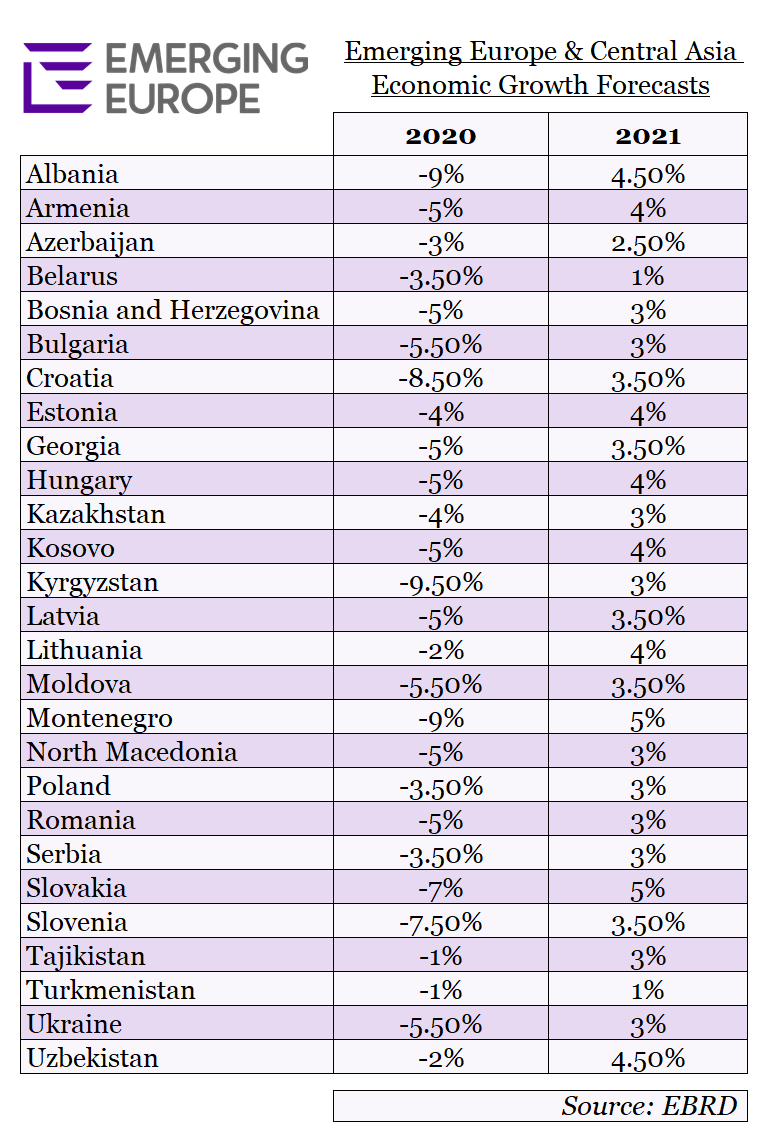The European Bank for Reconstruction and Development (EBRD) is forecasting a deeper economic contraction and softer recovery in 2021 for its region, saying the fallout from the Covid-19 pandemic had been longer lasting than expected.
The EBRD is now forecasting an overall contraction across its economies of 3.9 per cent this year, and a return to growth next year of 3.6 per cent. Previous forecasts published in May had projected a 2020 decline of 3.5 per cent and a stronger recovery of 4.8 per cent in 2021.
“Output in the EBRD regions contracted sharply in the second quarter of 2020 by around 8.2 per cent year-on-year,” says EBRD Chief Economist Beata Javorcik. “In many economies the contraction was larger than declines seen during the global financial crisis. The speed of recovery is expected to be similar to the one observed in the aftermath of that crisis, with pre-pandemic levels of GDP returning towards the end of 2021.”
EBRD economies have seen pressure on supply and demand because of domestic measures to contain the pandemic, while external shocks have included low commodity prices, shrinking exports, a collapse in tourism and drops in remittances.
The bank’s latest set of forecasts are subject to a high level of uncertainty and are dependent to some extent on the accuracy of early estimates of growth in the first half of 2020.
They are also sensitive to whether governments impose further lockdowns or to how people may react to a continuation of the virus, possibly by self-imposed social distancing.
The new report warns that some sectors, such as tourism, may face lasting damage in the longer term, but says others, such as online retail, could benefit from increased digitalisation.
It says that contractions this year are likely to be largest in economies highly dependent on external sources of income, such as Albania, Croatia, Cyprus, Greece and Montenegro which lost most of their tourist season this year.
Exports from EBRD regions were down by over 14 per cent in the first half of 2020, compared with the same period of 2019. International as well as domestic tourism fell sharply, with international tourist arrivals to the EBRD regions down by some 65 per cent in the first six months, compared with the same period a year earlier.
Other highly affected economies include countries that saw large drops in remittances such as the Kyrgyzstan, or which are strongly integrated within global value chains, such as Slovakia.
Remittances from Russia to Central Asia, eastern Europe and the Caucasus fell by 29 per cent year on year in the second quarter of 2020, relative to the same period of 2019, similar to the decline seen during the global financial crisis. Payments back to Serbia fell by 30 per cent in January to May 2020, compared with a year earlier.
The report said that, while some remittances may have been only postponed, many migrants returned to their home countries, suggesting that remittances may fall further in the future.
In a separate study, carried out together with German research institute Ifo, the EBRD also looked at the more detailed impact on the population in Belarus, Egypt, Greece, Hungary, Poland, Serbia, Turkey and Ukraine. It found that one-third of households in Egypt and a quarter of households in Turkey, Ukraine and Belarus had reduced food consumption.
Overall, 73 per cent of respondents said they were personally affected.
“We are particularly concerned about lower income people in countries that are not set to benefit from European firepower,” said Javorcik, referring to the unprecedented stimulus measures launched by countries in the European Union to help shore up economies against the coronavirus fallout.

—
Unlike many news and information platforms, Emerging Europe is free to read, and always will be. There is no paywall here. We are independent, not affiliated with nor representing any political party or business organisation. We want the very best for emerging Europe, nothing more, nothing less. Your support will help us continue to spread the word about this amazing region.
You can contribute here. Thank you.


